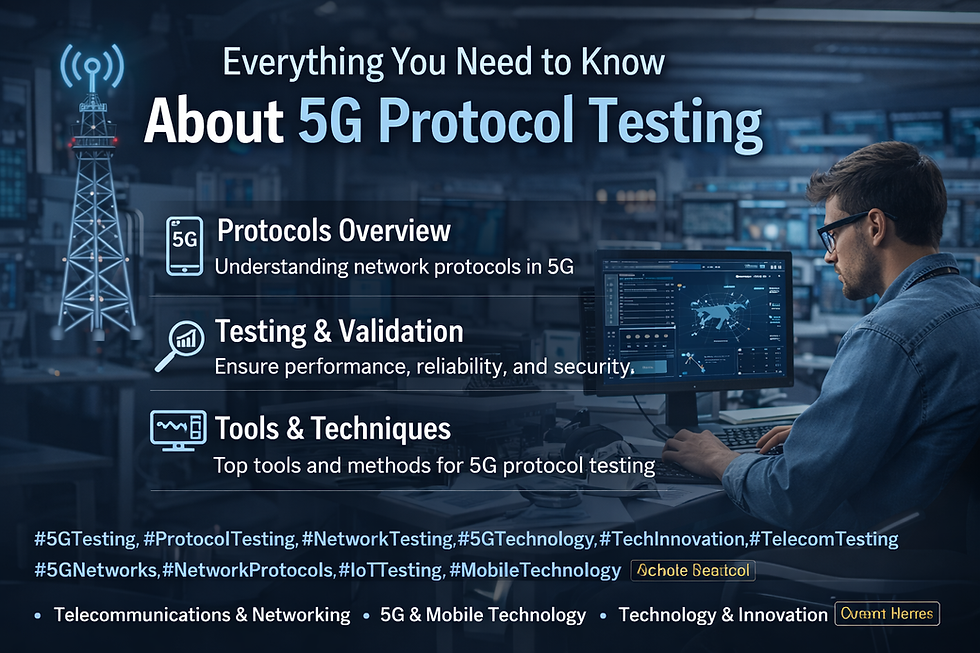5G Telco Cloud: A New Paradigm in Digital Services in 2024
- Shivram Mohan
- Jun 27, 2024
- 6 min read

In the era of digital transformation, 5G Telco Cloud emerges as a pivotal technology, reshaping how businesses deliver and consume digital services. This blog explores the revolutionary impact of 5G Telco Cloud on digital services, its applications across industries, and the promising future it holds for innovation and connectivity.
Table of Contents
Introduction
Understanding 5G Telco Cloud
Defining 5G Technology
Exploring Telco Cloud Infrastructure
Applications Across Industries
Healthcare
Manufacturing
Retail and E-commerce
Financial Services
Benefits of 5G Telco Cloud
Enhanced Connectivity and Speed
Real-Time Data Processing
Scalability and Flexibility
Challenges and Considerations
Security and Privacy
Infrastructure Investment
Regulatory Compliance
Future Innovations
Conclusion
Introduction
In the realm of telecommunications and digital services, the emergence of 5G Telco Cloud represents not just an evolution but a revolution. This introduction sets the stage for understanding the profound impact of 5G Telco Cloud on how businesses operate, consumers interact, and industries innovate.
The Evolution of Connectivity
The journey from 1G to 5G has been marked by significant advancements in speed, capacity, and connectivity. Each generation of mobile networks has built upon its predecessor, expanding the possibilities of what can be achieved in terms of data transfer, real-time communication, and network reliability.
5G, the fifth generation of mobile networks, stands out for its transformative capabilities. It promises to deliver ultra-fast speeds, near-zero latency, and massive connectivity, making it not just an enhancement but a catalyst for the Internet of Things (IoT), artificial intelligence (AI), augmented reality (AR), and much more.
Telco Cloud: A Paradigm Shift in Network Architecture
Telco Cloud complements the advancements of 5G by virtualizing network functions and services. Traditionally, telecommunications infrastructure has been characterized by physical hardware and rigid architectures. Telco Cloud, however, leverages cloud computing technologies to virtualize these functions, enabling telecom operators to deploy, manage, and scale network resources dynamically and efficiently.
This shift towards virtualization brings several benefits:
Scalability: Networks can scale up or down quickly in response to changing demands, ensuring optimal resource allocation.
Flexibility: Operators can deploy new services and applications rapidly without the constraints of physical infrastructure.
Cost Efficiency: By reducing hardware dependency and energy consumption, Telco Cloud offers potential cost savings.
Impact Across Industries
The implications of 5G Telco Cloud extend far beyond telecommunications. Virtually every industry stands to benefit from its capabilities:
Healthcare: Enhanced telemedicine capabilities, remote surgery, and real-time patient monitoring.
Manufacturing: Smart factories, IoT integration for predictive maintenance, and digital twins for simulation.
Retail and E-commerce: Augmented reality shopping experiences, personalized recommendations, and efficient supply chain management.
Financial Services: Secure and real-time transactions, AI-driven analytics, and regulatory compliance.
Entertainment and Media: High-definition streaming, immersive AR/VR experiences, and personalized content delivery.
Challenges and Considerations
While the potential benefits are vast, adopting and integrating 5G Telco Cloud comes with challenges:
Security: Protecting sensitive data in virtualized environments and safeguarding against cyber threats.
Infrastructure Investment: Upgrading network infrastructure and deploying new technologies to support 5G capabilities.
Regulatory Compliance: Navigating complex regulatory landscapes and spectrum allocation for 5G deployment.
Looking ahead, the future of 5G Telco Cloud holds promise for further innovation and transformation. Emerging technologies such as AI, edge computing, and blockchain are expected to converge with 5G, unlocking new possibilities for digital services, smart cities, autonomous vehicles, and more.
In conclusion, 5G Telco Cloud represents a paradigm shift in how we connect, communicate, and innovate in a digitally interconnected world. As businesses and industries embrace this new era of connectivity and virtualization, they pave the way for unprecedented growth, efficiency, and customer experience enhancement.
Understanding 5G Telco Cloud
Defining 5G Technology
5G represents the fifth generation of mobile networks, characterized by high-speed data transfer, ultra-low latency, and massive connectivity capabilities. Key features include:
Enhanced Data Rates: Enabling faster download and upload speeds, crucial for bandwidth-intensive applications.
Low Latency: Reducing delay in data transmission, critical for real-time applications like autonomous vehicles and augmented reality.
Massive IoT Connectivity: Supporting a vast number of connected devices, facilitating the Internet of Things (IoT) deployments.
Exploring Telco Cloud Infrastructure
Telco Cloud involves the virtualization of network functions and services using cloud computing technologies. It allows telecom operators to deploy and manage network resources efficiently, offering scalability, flexibility, and cost-effectiveness in delivering digital services.
Applications Across Industries
Healthcare
Telemedicine and Remote Care
5G Telco Cloud enhances healthcare delivery by enabling:
Remote Consultations: Facilitating virtual doctor visits and telemedicine consultations with high-definition video and real-time data transmission.
IoMT (Internet of Medical Things): Connecting medical devices and wearables for continuous patient monitoring and data collection, improving patient outcomes and operational efficiency.
Emergency Response and Remote Surgery
Real-time communication enabled by 5G Telco Cloud supports emergency response teams with instant access to critical patient information and remote surgical procedures performed with precision and minimal latency.
Manufacturing
Smart Factories and IoT Integration
5G Telco Cloud revolutionizes manufacturing by:
IoT Integration: Connecting machines, sensors, and robotics to optimize production processes and enable predictive maintenance.
Digital Twins: Creating virtual models of physical assets for simulation and analysis, improving operational efficiency and reducing downtime.
Supply Chain Optimization
Enhanced connectivity and real-time data processing capabilities streamline supply chain operations, providing visibility into inventory management, logistics, and transportation for efficient resource allocation and cost savings.
Retail and E-commerce
Enhanced Customer Experiences
5G Telco Cloud transforms retail and e-commerce with:
Augmented Reality (AR) and Virtual Reality (VR): Enhancing virtual shopping experiences, product visualization, and interactive customer engagement.
Personalized Recommendations: Leveraging AI-driven analytics to deliver tailored shopping experiences and targeted promotions based on customer preferences and behavior.
Inventory Management and Fulfillment
Real-time inventory tracking and logistics optimization powered by 5G Telco Cloud improve inventory management accuracy, reduce out-of-stock situations, and enhance order fulfillment efficiency to meet customer demands.
Financial Services
Secure and Real-Time Transactions
5G Telco Cloud ensures secure and reliable financial transactions through:
Enhanced Security Protocols: Protecting sensitive data and preventing fraud with robust encryption and authentication mechanisms.
Real-Time Data Analytics: Facilitating instant insights into market trends, customer behavior, and risk assessment for informed decision-making and personalized financial services.
Benefits of 5G Telco Cloud
5G Telco Cloud introduces a host of transformative benefits across various sectors, revolutionizing how businesses operate and deliver services. Here’s a closer look at the advantages:
Enhanced Connectivity and Speed
5G Telco Cloud delivers unparalleled speed and connectivity, significantly surpassing its predecessors. Key benefits include:
Ultra-Fast Speeds: Capable of supporting download speeds up to 10 Gbps, enabling rapid data transfer and seamless multimedia streaming.
Low Latency: Reducing latency to as low as 1 millisecond, crucial for real-time applications like autonomous vehicles, telemedicine, and gaming.
High Capacity: Supporting a massive increase in connected devices per square kilometer, facilitating IoT deployments and smart city initiatives.
Real-Time Data Processing
Integration with Telco Cloud enables edge computing capabilities, enhancing real-time data processing and analysis:
Edge Computing: Processing data closer to where it is generated, reducing latency and improving response times for latency-sensitive applications.
Real-Time Insights: Facilitating instant decision-making based on actionable insights derived from data analytics at the network edge.
Enhanced Reliability: Ensuring continuous operation and minimal downtime by distributing computing resources across geographically dispersed edge locations.
Scalability and Flexibility
Telco Cloud infrastructure offers scalability and flexibility, enabling operators to adapt to evolving business needs:
Dynamic Resource Allocation: Scaling network resources up or down based on demand fluctuations, optimizing operational efficiency and cost-effectiveness.
Service Agility: Accelerating the deployment of new services and applications without the constraints of physical infrastructure, fostering innovation and competitive advantage.
Multi-Tenancy Support: Enabling multiple virtual network slices to coexist on a shared physical infrastructure, ensuring isolation and tailored service delivery for diverse use cases.
Cost Efficiency
5G Telco Cloud introduces cost efficiencies through optimized resource utilization and reduced operational expenses:
Reduced Capital Expenditure: Minimizing upfront investment in hardware through virtualized network functions and centralized management.
Lower Operating Costs: Streamlining network operations and maintenance with automated workflows and remote management capabilities.
Energy Efficiency: Optimizing energy consumption with virtualized infrastructure, reducing carbon footprint and operational expenses associated with cooling and power consumption.
Enhanced Security and Privacy
While virtualized environments pose security challenges, 5G Telco Cloud incorporates robust security measures to safeguard data:
End-to-End Encryption: Securing data transmission between devices, network components, and cloud-based applications.
Authentication and Access Control: Implementing stringent access controls and authentication mechanisms to prevent unauthorized access.
Compliance and Governance: Adhering to regulatory standards and industry best practices to protect customer data privacy and ensure compliance with data protection regulations like GDPR and CCPA.
Challenges and Considerations
Security and Privacy
Virtualized network environments and cloud-based infrastructures introduce security challenges such as data breaches, cyber threats, and compliance with regulatory standards like GDPR and CCPA.
Infrastructure Investment
Deploying 5G Telco Cloud requires substantial investment in upgrading network infrastructure, deploying new technologies, and ensuring compatibility with existing systems to support advanced digital services.
Regulatory Compliance
Navigating regulatory frameworks and obtaining spectrum licenses are essential for deploying and operating 5G Telco Cloud networks, ensuring compliance with local and international regulations governing data protection, privacy, and network security.
Future Innovations
The future of 5G Telco Cloud in digital services holds promising advancements in:
AI and Machine Learning: Enhancing predictive analytics, automation, and personalized services based on real-time insights and data-driven decision-making.
Blockchain Technology: Streamlining transactions, enhancing transparency, and improving security in financial services, supply chain management, and digital identity verification.
Edge Computing: Expanding capabilities for processing and storing data at the network edge, supporting IoT deployments, and enabling low-latency applications in autonomous vehicles and smart cities.
Conclusion
5G Telco Cloud represents a new paradigm in digital services, empowering industries with enhanced connectivity, real-time data processing capabilities, and scalability. As organizations embrace these advancements, they unlock opportunities for innovation, efficiency, and customer-centric experiences in a rapidly evolving digital landscape. By leveraging the transformative power of 5G Telco Cloud, businesses are poised to lead in delivering next-generation digital services that meet the demands of a hyper-connected world.
References
Internal Links
External Links




Comments